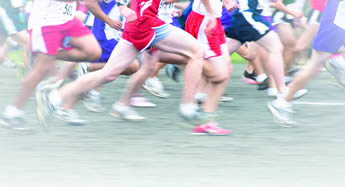On your marks and get set for the Olympics
Whilst the venues are being completed and the athletes are preparing, so too should businesses. In less than 200 days, the Olympics and the Paralympics will be coming to London (and not just to London, but to venues outside London as well, from Manchester to Portland).
From 27 July to 12 August, and then from 29 August to 9 September, the Games will be in full swing.
As with any major sporting event, employees are likely to want to watch certain events, many of which will be happening during the working day since the Games themselves will be happening in the UK and so time differences will not apply. Employers need to balance the requests of employees to have time off with the needs of the business.
The Olympics, however, will have a greater effect on UK businesses than purely requests to watch events. To give a sense of the scale of the issue, there are currently 3.5 million journeys each day on the London Underground. During the Games, an additional 20 million journeys will be made within London by spectators alone, with 3 million of those on the busiest day. Nor is it  purely a London problem – venues include Eton Dorney, Lee Valley, Hadleigh Farm (in Essex), and Weymouth and Portland, whilst Cardiff, Coventry, Glasgow, Manchester and Newcastle will co-host the football events. Even outside those areas, there may be knock on effects where traffic is displaced to less busy areas, causing delays.
purely a London problem – venues include Eton Dorney, Lee Valley, Hadleigh Farm (in Essex), and Weymouth and Portland, whilst Cardiff, Coventry, Glasgow, Manchester and Newcastle will co-host the football events. Even outside those areas, there may be knock on effects where traffic is displaced to less busy areas, causing delays.
Transport networks will be incredibly busy, particularly at peak competition and peak commuter times. Spectators will be encouraged to use public transport (tickets come with a Travelcard for the relevant day and the target for visitor use of public transport is 100%).
Statistics from the Sydney Olympics in 2000 showed that during the Games, 27% of local workers took annual leave, 24% varied their hours, 22% worked remotely, 18% travelled to and from work at different times from usual, and 15% changed the number of days worked per week. London 2012's Olympic Delivery Authority says that in order for the London Games to be a success, London employees will need to act in a similar way.
Managing annual leave
Many employees may want to take leave during the Games period - whether because they want to attend the Games as a spectator or a volunteer, to avoid the difficult journey to work, or simply because it will be the school summer holidays.
 To manage this effectively, consider now how many staff are needed to run the business during this period, and identify as soon as possible how many employees will be asking to take leave. In the event of conflict between required staffing levels and numbers of those wishing to take leave, consider how requests will be managed. There may already be a system in place to resolve problems, but if not then consider putting one in place, if possible after consultation with employees for the sake of transparency and fairness.
To manage this effectively, consider now how many staff are needed to run the business during this period, and identify as soon as possible how many employees will be asking to take leave. In the event of conflict between required staffing levels and numbers of those wishing to take leave, consider how requests will be managed. There may already be a system in place to resolve problems, but if not then consider putting one in place, if possible after consultation with employees for the sake of transparency and fairness.
How should HR prepare for the Olympics? |
Employers should, wherever possible, be: |
Working from home
Not all businesses can support employees working from home, and not all roles can be adequately performed off-site. However, for those that can, allowing staff to work remotely can work well. Businesses should consider which roles are suitable.
From a practical point of view, remote working is successful only insofar as the infrastructure that is in place to support it. Check what can be done from home and review internet access, voicemail access and computer system accessibility. Ask yourself: will the systems bear potentially large numbers of employees attempting to use these facilities at the same time?
Temporary relocation
If your business has more than one location, can employees work from another site for the duration of the Games? If there is not room for all employees at another location, could hot-desking or temporarily using meeting space as desks help?
Altered working hours
 Changing working hours for the period of the Games means that employees will not have to travel in the peak hours. Provided that such changes are compatible with the needs of the business, employers could consider changing core hours or operation, allowing staff to work compressed weeks (for example, longer hours but over only four days), or staggering start and finish times across the organisation.
Changing working hours for the period of the Games means that employees will not have to travel in the peak hours. Provided that such changes are compatible with the needs of the business, employers could consider changing core hours or operation, allowing staff to work compressed weeks (for example, longer hours but over only four days), or staggering start and finish times across the organisation.
Alternative ways of travelling
Can employees travel to work using a different mode of transport, by walking or by cycling? Many employers already take part in the HMRC approved Cycling to Work scheme, which allows employees to buy bicycles at a reduced rate. If your business does not already operate this, then you could consider doing so – aside from the benefits during the Olympics, exercise also encourages a healthy workforce (and is in keeping with the Olympic message).
Employers may also want to add new bike storage (or to temporarily share facilities with nearby businesses).
To help you prepare and communicate your business's policy line to staff in good time, Taylor Wessing LLP's Employment Group has prepared a draft policy for organisations to adapt for their own needs.
If you have any questions on this article please contact us.

"Many employees may want to take leave during the Games period - whether because they want to attend the Games as a spectator or a volunteer, to avoid the difficult journey to work, or simply because it will be the school summer holidays."

